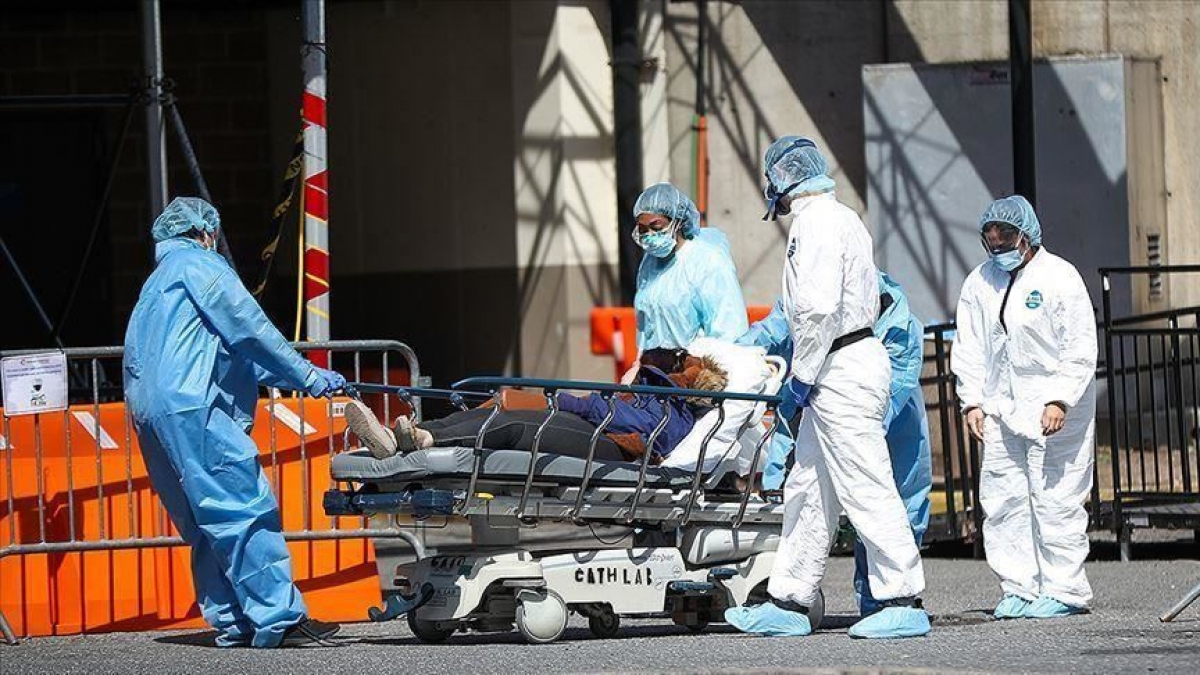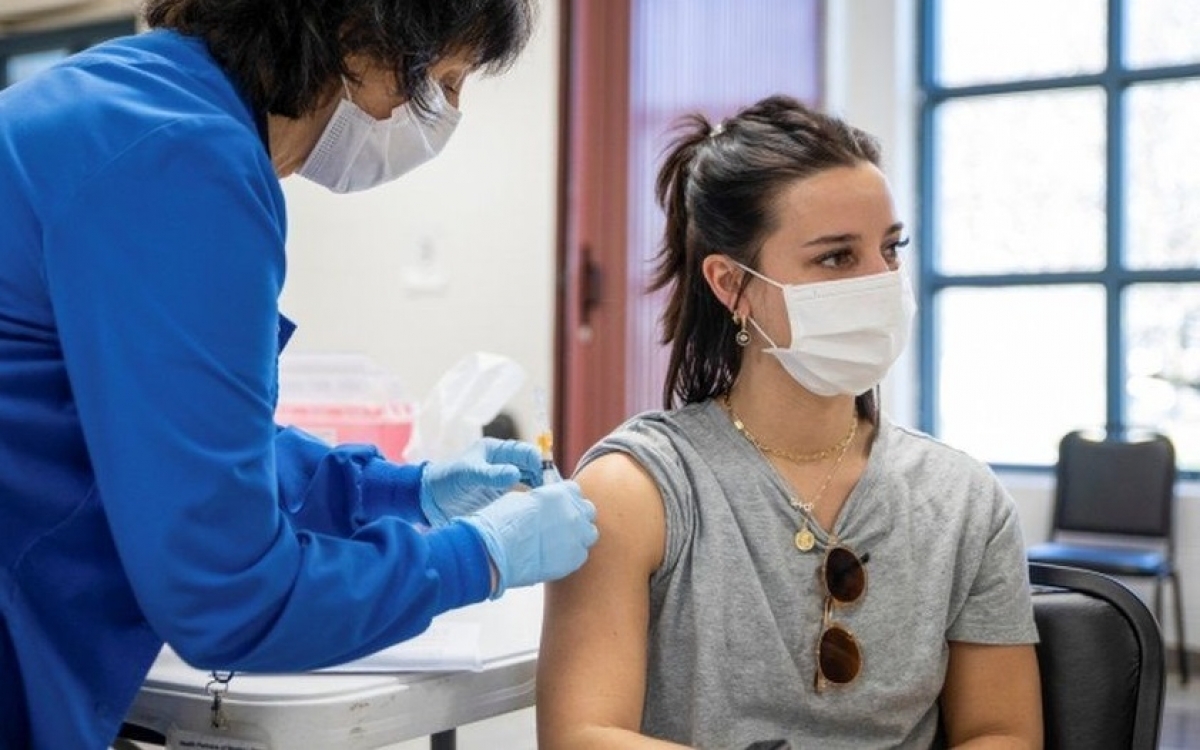The terrible effects of the Covid-19 pandemic changed the world
Politics
The Covid-19 pandemic has affected the regulatory and political systems of many countries. This caused disruption to legislative activities, and elections had to be postponed due to concerns about the spread of the SARS-CoV-2 virus.

To date, the Covid-19 pandemic has claimed the lives of more than 535 million people globally. Photo: Getty Images
Covid-19 has changed the support rates of governments. During the early period of the pandemic, the approval rating of the Italian government increased by 27 percentage points and the support of the German and French governments increased by 11 percentage points. However, this approval rating changes over time due to how each country handles the pandemic. For example, the UK government’s approval rating fell from 51% in March 2020 to 41% in July 2021, while it increased in France from 27% to 35% in the same span. time.
Do Covid-19 pandemic spread rapidly, many countries had to postpone elections or hold while candidates did not have much effective campaigning.
The National Assembly elections in Argentina for 2021 were previously scheduled to take place on October 24, 2021, but were postponed to November 14, 2021 due to the Covid-19 pandemic. In 2021, the Italian government announced the postponement of local elections until after the summer amid the complicated developments of the Covid-19 epidemic in the country. In 2020, the Hong Kong government (China) postponed the Legislative Council election in September to 2021, saying that this was necessary due to the Covid-19 epidemic still spreading strongly.
In August 2020, New Zealand Prime Minister Jacinda Ardern announced that the election would be postponed for nearly four weeks from September 19 to October 17. Due to concerns about the spread of Covid-19 and the inability of political parties to campaign properly, Ms. Ardern agreed to calls from opposition parties and the government to delay the election.
naitional defense
Besides the political sphere, Covid-19 has had a significant impact on the defense of each country. The widespread spread of the pandemic could limit the military’s ability to perform its duties. Many military exercises and trainings have been postponed or cancelled.
In February 2020, South Korea and the US canceled joint military exercises scheduled to take place in March 2020. The Israel Defense Forces have implemented social distancing with many measures such as dividing soldiers into separate training shifts and minimizing contact between soldiers and civilians. In addition, Israeli forces also require soldiers to wear masks, use personal protective equipment and sanitizer during training.
At the beginning of the Covid-19 pandemic, the Norwegian armed forces canceled the Cold Response exercise expected to involve NATO members and their allies.
During the first wave of the pandemic in Italy, the country’s armed forces worked with the national government to provide healthcare and logistical support across the country.
In France, President Emmanuel Macron launched the “Operational Resilience” campaign, allowing the armed forces to assist people during the outbreak of the pandemic.
In March 2020, the US Department of Defense banned the deployment of troops for 60 days to minimize the spread of the virus. In addition, the US canceled large-scale exercises involving thousands of troops in the Philippines in May 2020.
Medical
Health policy and healthcare are the things that have changed the most during the Covid-19 pandemic.
Telemedicine services have skyrocketed as doctors’ offices limit in-person visits due to Covid-19. Telemedicine is not a completely new method born because of Covid-19, but the pandemic has turned the service from a little-known method to a new way of health care. In particular, changes in health policy during the pandemic have helped break down some barriers to telemedicine access.
The Covid-19 vaccine is considered a “miracle” in dealing with the pandemic. Scientists have impressed the world by rapidly developing a Covid-19 vaccine in record time. The vaccine from Pfizer/BioNTech, then Moderna, was approved for eligible adults in the US less than a year after development.

Get vaccinated against Covid-19 in the US. Photo: Reuters
According to data from Our World in Data, to date, more than 66% of the world’s population has received at least one dose of the Covid-19 vaccine and more than 60% have received 2 doses of the vaccine.
“Covid-19 vaccines have had a huge impact on preventing deaths and helping economies get back to normal. In countries with high vaccination coverage, even with new waves of infections, the number of deaths remains low,” said World Health Organization (WHO) scientist Soumya Swaminathan. .
The rapid development and deployment of Covid-19 vaccines has saved at least 750,000 lives in the US and Europe alone.
A study from the WHO and the European Center for Disease Prevention and Control in Solna, Sweden, estimates that 470,000 deaths have been prevented by Covid-19 vaccines in 33 European countries, in the region alone. The target area is people 60 years of age and older.
Another study by epidemiologists at Yale University in New Haven, Connecticut (USA) showed that by the end of 2021, more than 279,000 people in the US had been saved by vaccination against Covid-19.
However, despite the incredible success of the Covid-19 vaccine, the world still sees profound vaccine inequality.
President of the United Nations General Assembly Abdulla Shahid said that although more than 10 billion doses of the Covid-19 vaccine have been administered to the global population, a number that is enough to vaccinate the entire population of the world, but 38% People in Africa have yet to receive their first dose of the vaccine. In addition, there are 27 countries with vaccination rates of less than 10% of the population, while many other countries have given their people the third dose and fully reopened their economies.
Economy
The Covid-19 pandemic has had far-reaching economic consequences including the second-largest global recession in recent history.
Some countries are still in a deep recession, while others are better off than before the pandemic. The economies of Denmark, Norway, Sweden, and the United States are still operating quite well. However, many major countries in Europe, including the UK, Germany, Italy and Spain, have a darker economic situation.
Several countries in Southern Europe, which rely heavily on tourism, are vulnerable to travel bans and a drop in service spending.
Countries like Belgium and the UK, which have recorded high numbers of Covid-19 cases and deaths, have constrained consumer spending.
In some countries, especially those that are not strongly affected by Covid-19, the labor market has not been affected too much.
Japan’s unemployment rate has barely changed since the outbreak of the pandemic. Meanwhile, this rate in Spain increased by 3% between February and August 2020.
Some countries make up for their people’s falling incomes with economic support packages. In the US, despite the high unemployment rate when the economy fell into recession, households still received more than $2 million from the government in the form of unemployment benefits and economic stimulus packages.
at Blogtuan.info – Source: Kenh14.Vn – Read the original article here



